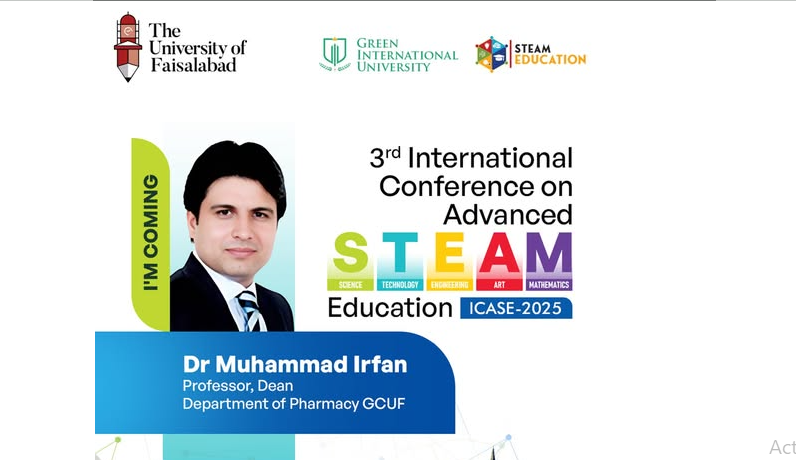Food Supplements for Gastrointestinal Health: From Mechanistic Insights to Clinical Evidence
The role of food supplements in maintaining gastrointestinal health has become an increasingly significant area of research, linking molecular mechanisms to tangible clinical benefits. At the STEAM Conference 2025, a dedicated session on “Food Supplements for Gastrointestinal Health: From Mechanistic Insights to Clinical Evidence” was held in Saleem Auditorium, Venue 2, under the Pharmacy 2 track.
The session was chaired by Dr. Muhammad Irfan (GC University, Faisalabad), who emphasized the importance of translating basic mechanistic research into evidence-based clinical applications for gut health. Supporting him as Co-Chair, Dr. Aamna Habib (The University of Faisalabad) highlighted the potential of nutraceuticals and functional foods in addressing gastrointestinal and metabolic disorders, particularly in populations with a high prevalence of chronic conditions.
Keynote Insight: Ethical Dimensions of AI in Nutraceutical Research – Hammad Ullah (University of Naples Federico II, Italy)
The session commenced with an invited talk by Hammad Ullah, discussing the ethical considerations of integrating artificial intelligence into nutraceutical research and product development. He highlighted the balance between innovation and responsibility, emphasizing that AI-driven insights must comply with regulatory, safety, and ethical frameworks while enhancing research efficiency.
Invited Talks Advancing Gastrointestinal Health and Nutraceutical Research
Serum Levels of Angiopoietin-1 in Post-Myocardial Infarction Patients – Uzma Ali & Faiza Habib (University of Health Sciences, Lahore, Pakistan)
Uzma Ali and Faiza Habib presented findings on serum angiopoietin-1 levels in diabetic and non-diabetic patients after myocardial infarction. Their research underscored the interplay between cardiovascular and gastrointestinal health, demonstrating how metabolic regulation can influence nutrient absorption and therapeutic responses.
Prunus domestica subsp. Syriaca Fruit Extract for Postprandial Hyperglycemia – Areesha Tufail (University of Management and Technology, Lahore, Pakistan)
Areesha Tufail discussed the bioaccessible nutraceutical potential of Prunus domestica subsp. Syriaca fruit extract in managing postprandial hyperglycemia. Her study highlighted its mechanistic action in regulating glucose metabolism, providing insights for its application in functional foods and dietary interventions.
Wound Healing Hydrogel Using Novel Oligomers – Rabia Khokhar (University of Veterinary & Animal Sciences, Lahore, Pakistan)
Rabia Khokhar presented research on hydrogel fabrication using novel oligomers, focusing on gastrointestinal mucosal repair and tissue regeneration. The study demonstrated how bioactive polymers can be employed to enhance gastrointestinal healing and supplement therapeutic strategies.
Fruit Extract Mitigates MASLD Pathology – Sana Zahir (University of Management and Technology, Lahore, Pakistan)
Sana Zahir explored the protective effects of Prunus domestica subsp. Syriaca fruit extract against metabolic dysfunction-associated fatty liver disease (MASLD). Her findings revealed their ability to modulate key biochemical pathways, highlighting the potential of dietary supplements in preventing liver-associated complications of metabolic disorders.
Disrupting Fibrogenic Pathways with Kaempferol and Coumestrol – Areeba Imtiaz (Government College University, Faisalabad, Pakistan)
Areeba Imtiaz discussed in silico and in vitro evaluations of kaempferol and coumestrol as anti-fibrotic agents. Her work demonstrated the role of phytochemicals in modulating fibrogenic pathways, offering promising strategies for gastrointestinal and hepatic health management.
Cardiometabolic Health Potential of Fruit Extract – Rooman Abeer (University of Management and Technology, Lahore, Pakistan)
Rooman Abeer presented insights on Prunus domestica subsp. Syriaca fruit extract as a source of bioactive compounds supporting cardiometabolic health. The study highlighted its antioxidant, anti-inflammatory, and metabolic regulatory properties, bridging the gap between dietary interventions and clinical outcomes.
Why Food Supplements Matter for Gastrointestinal Health
The session emphasized the significance of food supplements in modern healthcare:
- Mechanistic studies reveal molecular pathways supporting gut and metabolic health
- Functional foods and nutraceuticals offer preventive and therapeutic benefits
- Integrating AI-driven research can accelerate discovery while maintaining ethical standards
- Dietary interventions using bioactive compounds can address metabolic and liver disorders
- Translating laboratory findings to clinical evidence ensures safety, efficacy, and applicability
By combining mechanistic insights, clinical validation, and sustainable nutraceutical design, researchers can advance gastrointestinal health and overall metabolic wellness.
Conclusion
The session reinforced a clear message: food supplements and nutraceuticals are pivotal in bridging mechanistic science with clinical outcomes. Guided by Dr. Muhammad Irfan and Dr. Aamna Habib, ( TUF ) and enriched by contributions from Hammad Ullah, Uzma Ali, Faiza Habib, Areesha Tufail, Rabia Khokhar, Sana Zahir, Areeba Imtiaz, and Rooman Abeer, the discussion highlighted how functional foods and bioactive compounds can enhance gastrointestinal and cardiometabolic health.
Through evidence-based approaches, ethical innovation, and interdisciplinary research, Pakistan’s pharmaceutical and nutritional sciences community is poised to develop next-generation dietary solutions that improve patient care and public health outcomes.

